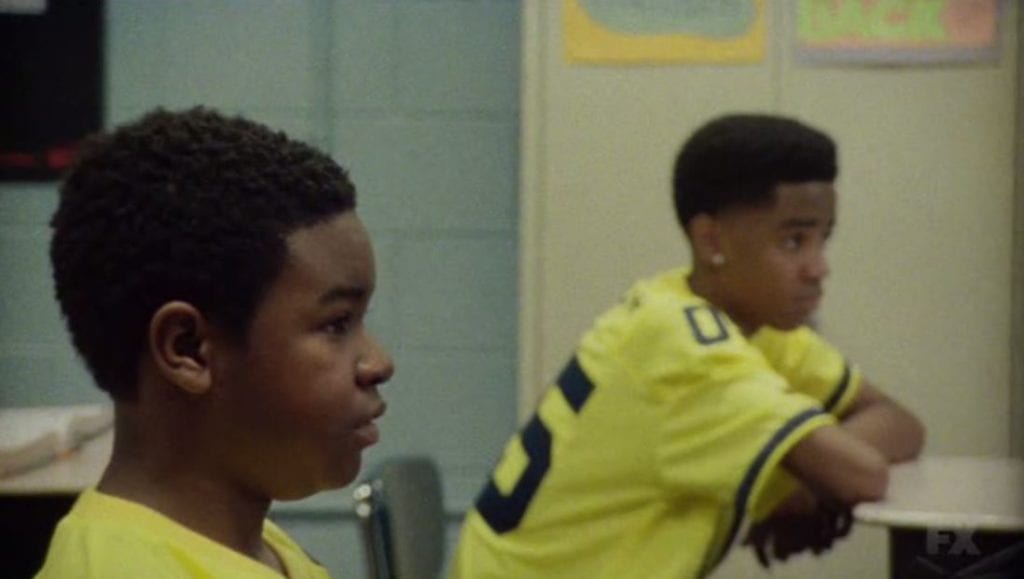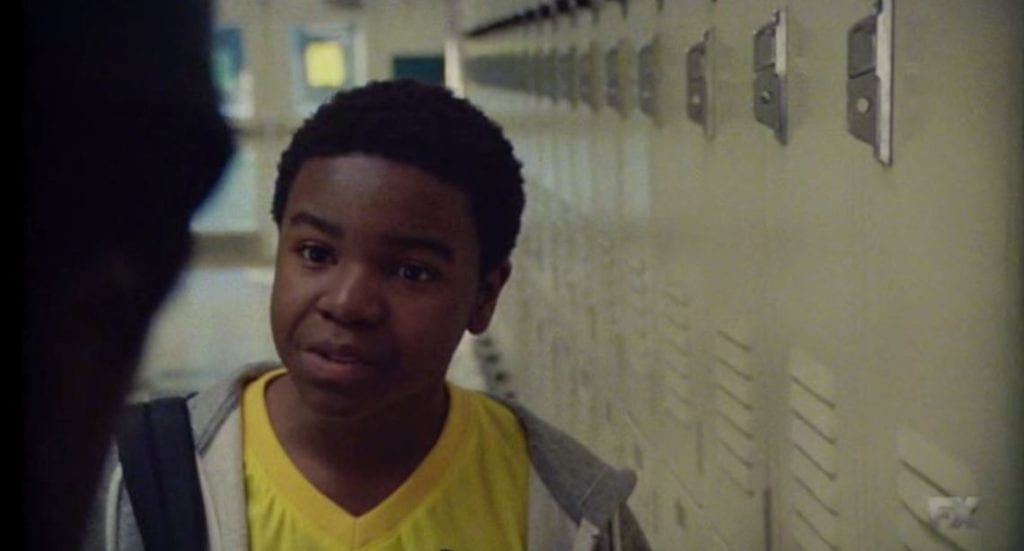Remember middle and high school? It can be very different depending on who you are and what school you go to. Demographics, area, and funding can make for drastically dissimilar experiences. And yet, the more things change the more they stay the same. Maybe you didn’t expect an episode of Atlanta like this in the aftermath of last week’s episode. I went into it unsure. I walked away thinking it was a surprisingly well placed episode.

Brotherhood of the Traveling FUBU Shirts
I imagine everyone dealt with clothing controversies in school. In middle/high school, especially, kids are just coming into maturity while retaining a lot of their immaturity. Clothes are an easy target for bullies and the kids who go along with them. Even in the richest schools, we all probably remember some moment where a kid was bullied over their clothing. Hell, we’ve all probably been that bullied student at some point.
Me, personally, I went to elementary and middle schools JUST like this episode portrayed. This hit hard. Atlanta recreated this scenario so well that I assume Donald Glover went through exactly this as a kid.
And yet, while I’ve certainly been that kid bullied because of his clothes, I can’t pretend I know what it’s like to be Earn or Devin. In the end, I was more like Earn’s white friend that would wear the same shirt twice in a week and get away with it. I think Atlanta included that brief bit with Earn’s friend to prove the usual point about differences in racial cultures.
The clothes you wore meant so damn much for black kids in my schools. Appearance was a huge deal. A lot of this has to do with financial inequality; unfortunately, it’s just not easy for kids in poorer neighborhoods to get a hold of FUBU back in the day or a pair of Air Jordans. If you do show up with legit brand gear, you’re the king. You’re hot shit. You will get girls passing you notes based solely on the shirt you wore.
On the flip side, of course, are those kids who try to pass off knock-offs as the real deal. Their parent/s can’t afford the real thing and you thing you can pass off something fake. Then you suffer horribly unfair consequences for it. The worst of it comes when a kid has no idea, like with Earn. Why should a kid be punished just for being tricked into buying knock-off clothing? Adults can’t even decipher the real brands from the fakes sometimes.
Unfortunately, that’s the way kids work and Atlanta captured it depressingly accurately.
Now, maybe the episode went too far by having the kid wearing the real FUBU commit suicide for being “exposed” as wearing fake FUBU. I understand how it’s a bit heavy-handed, and that the episode didn’t need that to happen to prove its point. Thing is, sometimes life is that blunt. It can especially be that blunt when it comes to kids, who deal with a lot of fragile emotional baggage and don’t always have the maturity or resources to find the help they need.
I know a lot of people have fond memories of school. You had fun with your friends and classes, you remember your teachers and clubs and stuff. There are a lot of people who look back on those years with yearning. Not me. This episode was an all too real depiction of how I remember school. It sucked hard. This episode was an example of the many days I have blocked out of my memory and why I remember very little from my days in school.
The More Things Change, the More They Stay the Same
The star of this episode? Young Earn. Casting a kid to play younger versions of the regular adult characters is often hit or miss. Atlanta hit and hit hard. Alkoya Brunson looked, sounded, and acted the part so well I swear he and Donald Glover must be related.
The kid did such a good job it’s almost depressing. If Atlanta wanted this episode to prove a point about how little life has changed for Earn since he was a kid, they succeeded. And that’s a sad thing.
I suppose you don’t have to be an expert character analyst to recognize Earnest Marks as something of a reluctant outsider. Atlanta made a point very early in its first season of showing the differences in how white people act and speak around him compared to Alfred or Darius. Various episodes since have used similar scenarios, where Earn tries desperately to fit into a crowd and fails. For whatever reasons, he just doesn’t fit. He comes across too nerdy for the hip hop crowd and he’s too black for the white crowd. He doesn’t fit in with Van’s friends, Al’s friends, or Darius’s weird friends.
“FUBU” did a great job capturing that same feeling in Earn’s school days. It’s obvious he’s a smart kid, and how that alienates him. You can see how desperately he wants to fit in yet never quite can. The bullying he went through was obviously nothing new and drove his desire to get the FUBU jersey. He thought he saw an opportunity to get some play for once.

This episode was actually like an earlier attempt at something Earn did back in “Money Bag Shawty,” where he spends an entire episode trying to use cash to come across as a bigger deal than he actually is. Substitute cash for the FUBU jersey and it’s basically the same thing. In both cases, young and old, Earn tries to use a status symbol to increase his status. In both cases he fails. Why? I mean, there are various reasons. Both cases boil down to Earn trying to be someone he isn’t and everyone recognizing it.
I think it says something that young Alfred cares so little about the fake jersey drama. For all the attention young Earn will get, young Alfred was just as fitting. He has a surety in his identity that allows him to isolate from the drama. He also shows that same distaste for the fakeness surrounding him that he shows as an adult. If there’s anything I learned socially from my days in school, it was how differently you will be treated when you are secure in yourself.
Earn did not and still has not learned this important lesson about life. All this season he has faked his ability to manage Paperboi. Eventually Alfred fired him for it. In a lot of ways, “FUBU” was a metaphorical summary of Atlanta’s second season to date. It starts off with Earn in a good spot with a lot of hope and quickly devolves into an awful day. Alfred even covers up for Earn’s fakeness just like he has throughout both seasons of the show.
Except now Alfred is done. Earn lost his job. Now he’s at a critical junction in his life and you wonder if he can finally recognize the flaws that have plagued him his entire life. He’ll need to if he wants to finally make something of himself. Things go wrong for him for a reason. It’s time for Earn to recognize those reasons.
Final Thoughts
One more episode remains for Atlanta this season. The subtitle “Robbin’ Season” has been used in a creative number of ways throughout. Characters have been robbed of money, possessions, dignity, respect, jobs, fame, innocence, relationships, and even lives. Will the finale set up one last major robbery to cap the season? What will it be? What else will Atlanta rob from these characters?
Namely, what the hell is Earn going to do now?
I’m hoping to see him end the season on a positive note. I find it fitting that Tracy talked to Earn about Bojack Horseman earlier in the season, because Earn’s story this season has very much resembled a seasonal arc for Bojack. He starts off in a good spot with something he wanted, and every episode afterwards slowly deconstructs the happiness he expected. By the end he’s a wreck. Bojack usually ends its seasons with Bojack in the position, yet again, to find the happiness and validation he seeks.
We’ll see if Atlanta gives Earn the same or keeps shoving him further down the hole he digs for himself. Maybe “Robbin Season” robs him one more time. Obviously I hope for something happy. I think we’ll get it. Even if he still ends the season in a bad place, I think we’ll see Earn in a position to find greater happiness in Atlanta’s third season.
From there we’ll see if he Bojacks it up again.

